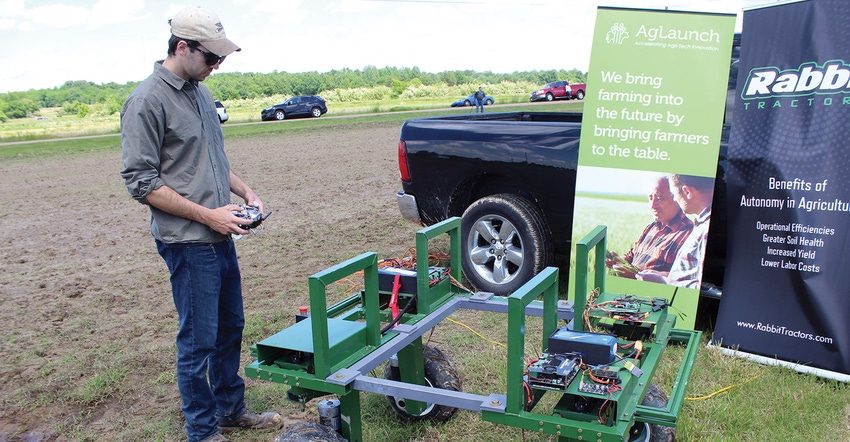
Rabbit Tractors was one of several ag start-up companies that participated in Davos on the Delta, a forward-thinking food and agricultural summit held recently in Memphis, Tenn. Rabbit Tractors founder, Zack James, exhibited one of the company’s autonomous tractor concepts he hopes will lead some people to re-think the way tractors, in their traditional use form, may be viewed.
“I look at autonomous farming as more than just saving labor costs,” says James. “If we consider how these smaller tractors may be used in the field, it could lead to changing the way traditional farms are managed.”
James has a vision of farms using many smaller tractors without increasing capital investment costs. “When the tractor is smaller, you can operate more of them over larger acreage,” says James. “They leave a smaller footprint on the land, and more importantly, they can operate 24/7.”
Smaller and lighter machines could reduce soil compaction, leading to a more productive soil profile, healthier plants, and increases in yield. “I compare autonomous tractors to horseless carriages,” says James. “You have to open your mind to a completely new type of farming operation.”
This type of innovation will not be appearing on farms next year — or even the next, but the current “chassis” will be expanded to include fairings, sensors, and a rigid plastic frame, and its placement into production could be sooner than later. “As we continue expanding the proof of concept, if you will, we will incorporate mounts for implements on the chassis as we move it toward the completed design,” says James.
The field day was hosted by Agricenter International — an urban farm located in Memphis, Tenn. Dr. Bruce Kirksey, the director of research, contracts each year with some of the largest ag companies to plant new varieties, test chemistries, and periodically host field days that highlight equipment like UAVs and robotics.
In 2018, Kirksey and his staff planted more than 20 crops over the Agricenter’s 1,000 acres of ground. From hops, barley, chick peas, and edamame, to snap beans, onions, and sorghum, the crop mix is diverse. “Some of the varieties we’re planting have not been commercially released, but we’re growing some crops to evaluate the efficacy of new chemistries,” says Kirksey. “Some of those new chemistries are being tested for plant tolerance, for example. We’re sort of a proving ground for ag technologies, as well as ag products centric to the Mid-South.”
Davos on the Delta has already gone from a small grassroots effort to becoming more formalized with a committee and new conference director — Carter Williams. “Carter spent much of his career managing more than $600 million in early-stage ventures and research that generated several billion dollars in new product revenues,” says John Santi, who, along with Paul Noglows, CEO, iSelect Fund, in St. Louis, Mo., are co-founders of the Davos on the Delta event.
Davos on the Delta provides a secure forum that allows forward-thinking entrepreneurs to feel comfortable enough to speak openly about their ideas without them being stolen or copied. The field day portion of the event allowed some of those companies to show their products in a field setting.
Just as Davos on the Delta has a long-range plan that includes even more forward-thinking ag initiatives, Agricenter International and Bruce Kirksey look forward to conducting next-generation agricultural research and hosting field days showcasing farming technologies that may one day be adopted for use on farming operations of the future.
About the Author(s)
You May Also Like




